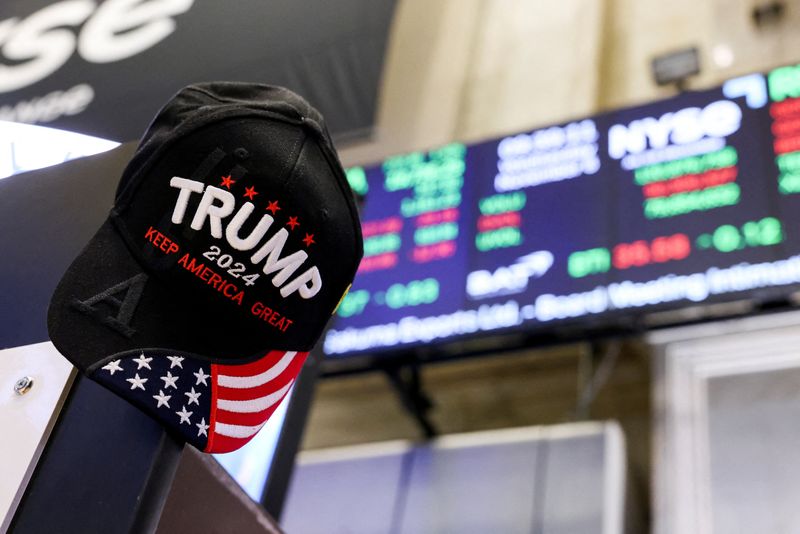
By Alden Bentley and Naomi Rovnick
NEW YORK/LONDON (Reuters) -Global stock markets rallied on Friday, with Wall Street crowning November with its biggest monthly gain in a year on post-election growth hopes, while the dollar eased amid prospects for firmer rates in Japan and easing in Europe.
U.S. trading was thin the day after Thanksgiving. Many investors made it a long weekend and stocks and bonds closed early, so most month-end position adjustments were done before the holiday.
The S&P 500 rose 0.56% to mark the best monthly gain since November 2023 of 5.14%, while the Nasdaq’s 0.83% rise Friday secured a 6.2% gain for the month, it’s best since May.
MSCI’s broad gauge of world stocks rose 0.52%, also securing the best month since May.
Donald Trump’s Nov. 5 election victory and pledges of tax cuts, deregulation and import tariffs have supercharged investors’ expectations for U.S. and Wall Street stocks to keep outperforming other regions. U.S. tech shares are also benefiting from an artificial intelligence investing craze.
Speculation about Japanese rate hikes drove a rebound for the yen, which ended with the biggest weekly gain vs the buck since July. The dollar fell 1.25% on the day to 149.65 yen. It delved 149.46 yen in late trade, the lowest since Oct. 21, under pressure after Japan’s government finalised a stimulus budget and inflation in Tokyo came in hotter than economists expected.
The dollar index, which measures the currency against six major rivals, fell 0.26% to 105.79, ending the week 1.4% lower thanks to a sudden rebound for the euro, which had been lurching towards the key $1 marker on tariff fears and a bleak euro zone outlook
The outlook for lower U.S. rates has also weighed on the dollar. Trump’s import tariffs could boost U.S. inflation, Federal Reserve officials have turned cautious on rate cuts while futures traders put odds that the Fed will cut rates another 25 basis points at December’s meeting at 65%. However, for 2025 they see less chance that the central bank will continue to bring rates down at the same pace as this year.
“The dollar is a little bit weaker. That’s helpful for the multinationals in the S&P 500,” said Quincy Krosby, chief global strategist, LPL Financial in Charlotte, North Carolina.
Trump has pledged immediate 25% tariffs on all products from Mexico and Canada when he takes office in January and an additional 10% on imports from China, a major trading partner for Asian economies and euro zone export powerhouse Germany.
“President-elect Trump has called out Canada, Mexico, and China for now, but Europe is not far down the list,” strategists at BCA Research said, recommending investors limit their exposure to European stocks and favour German government bonds.


